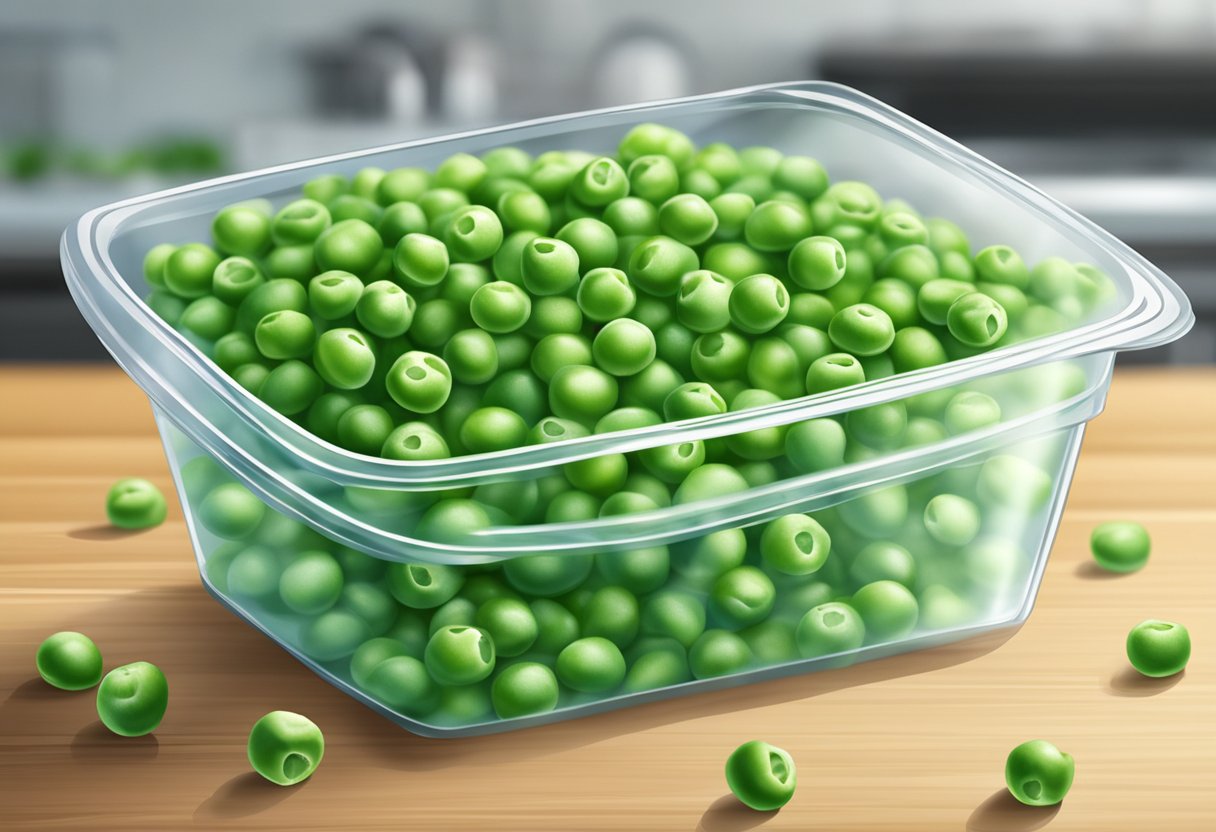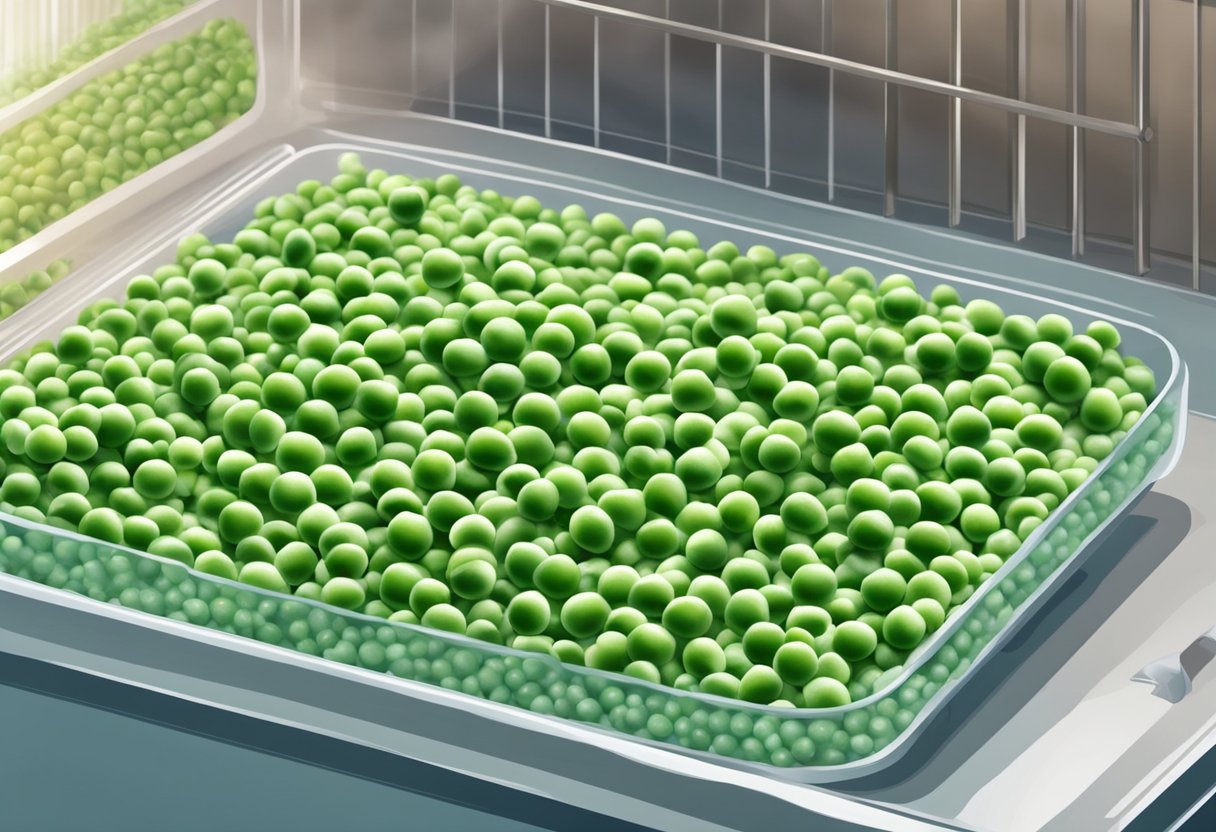I feel you. You’re making a roast dinner but you’ve forgotten the peas. It’s crossed my mind too. Is it safe to eat frozen peas? While they may not be the nicest to consume, let’s find out if they’re safe…

Is It Safe to Eat Frozen Peas
In general, frozen peas are safe to eat. They are usually blanched before freezing, which helps to preserve their nutrients and flavor. Additionally, frozen peas are often packaged in a way that prevents contamination and spoilage. However, like all food products, it is important to handle and store frozen peas properly to ensure their safety.
Safe Consumption of Frozen Peas
The good news is that frozen peas are generally safe to eat. They are processed and packaged to minimize the risk of contamination by harmful bacteria. However, it is still important to follow proper food safety practices to ensure that the peas are definitely safe to eat.
One of the main concerns with frozen peas is the risk of foodborne illness. This can be caused by harmful bacteria such as Listeria monocytogenes, Salmonella, and E. coli. These pathogens can cause serious illness and even death in some cases.
To reduce the risk of foodborne illness, it is important to handle frozen peas properly. This includes storing them at the correct temperature and cooking them thoroughly. It is also important to wash your hands and any utensils or surfaces that come into contact with the peas to prevent contamination.
The Centers for Disease Control and Prevention (CDC) recommends cooking frozen vegetables to an internal temperature of 165°F to kill any disease-causing bacteria. It is also important to avoid cross-contamination by keeping frozen peas separate from raw meat, poultry, and seafood.
Storing and Thawing Frozen Peas

When it comes to storing frozen peas, it is important to keep them in a freezer that maintains a temperature of 0°F or lower. This ensures that the peas remain safe to eat for an extended period. Storing the peas at a higher temperature can cause them to develop ice crystals, which can negatively affect their texture and flavor.
When it comes to thawing frozen peas, there are a few different methods that can be used. One option is to transfer the peas from the freezer to the refrigerator and let them thaw slowly over the course of several hours or overnight. This method helps to prevent the growth of harmful bacteria and ensures that the peas remain safe to eat.
Another option is to thaw the peas quickly by placing them in a bowl of cold water. This method can be faster than using the refrigerator, but it is important to ensure that the peas are fully submerged in the water and that the water is changed every 30 minutes to prevent the growth of harmful bacteria.
It is important to note that once frozen peas have been thawed, they should not be refrozen. Refreezing can cause the peas to develop ice crystals, which can negatively affect their texture and flavor. If you have leftover thawed peas, they should be stored in the refrigerator and consumed within two days.
Cooking Methods for Frozen Peas
Boiling
Boiling is a quick and easy way to cook frozen peas. Simply bring a pot of salted water to a boil, add the frozen peas, and cook for 2-3 minutes until tender. Drain and serve.
Steaming
Steaming is a gentle cooking method that preserves the nutrients and flavor of frozen peas. Place the frozen peas in a steamer basket over a pot of boiling water and steam for 3-5 minutes until tender.
Microwave
Microwaving is a convenient way to cook frozen peas. Place the frozen peas in a microwave-safe dish with a tablespoon of water, cover with plastic wrap, and microwave on high for 2-3 minutes until tender.
Roasting
Roasting frozen peas is a delicious way to add flavor and texture to this humble vegetable. Toss the frozen peas with a little olive oil, salt, and pepper, and roast in a preheated oven at 425°F for 15-20 minutes until golden brown and crispy.
Sautéing
Sautéing frozen peas is a quick and easy way to add them to a stir-fry or pasta dish. Heat a little oil in a pan over medium-high heat, add the frozen peas, and cook for 3-4 minutes until tender.
Frozen peas can be used in a variety of recipes, such as soups, salads, and casseroles. They are a healthy and affordable ingredient that can be enjoyed year-round.
Potential Health Risks
While frozen peas are generally safe to eat, there are some potential health risks to consider. One of the main concerns is the risk of listeriosis, a serious infection caused by the bacterium Listeria monocytogenes.
Pregnant women, newborns, and individuals with weakened immune systems are particularly susceptible to listeriosis. Symptoms of the infection include fever, muscle aches, and gastrointestinal symptoms such as nausea and diarrhea. In severe cases, listeriosis can lead to meningitis or sepsis.
To minimize the risk of listeriosis, it is important to handle frozen peas safely. This includes storing them at the proper temperature, cooking them thoroughly, and avoiding cross-contamination with other foods.
In addition to listeriosis, there are other potential health risks associated with frozen peas. For example, some individuals may be allergic to peas or other ingredients used in frozen pea products. It is important to read ingredient labels carefully and avoid products that contain allergens.
Frequently Asked Questions
Are frozen peas safe to eat uncooked?
Yes, frozen peas are safe to eat uncooked. They are cleaned and processed before being frozen, so they are free from harmful bacteria and parasites.
Do frozen peas need to be cooked before eating?
No, frozen peas do not need to be cooked before eating. They can be thawed and eaten as a snack or added to salads and smoothies.
Can toddlers safely consume frozen peas?
Yes, toddlers can safely consume frozen peas. However, it is important to supervise them to prevent choking hazards.
Can dogs eat frozen peas without any harm?
Yes, dogs can eat frozen peas without any harm. Peas are a good source of fiber, vitamins, and minerals for dogs. However, it is important to feed them in moderation and avoid seasoning or adding any spices.
Is it healthy to consume frozen peas?
Yes, frozen peas are healthy to consume. They are a good source of fiber, protein, vitamins, and minerals. They are also low in fat and calories, making them a great addition to a healthy diet.
What is the recommended serving size for frozen peas?
The recommended serving size for frozen peas is about 1/2 cup or 80 grams. This serving size provides about 4 grams of protein and 4 grams of fiber. However, the serving size may vary depending on individual needs and dietary requirements.
